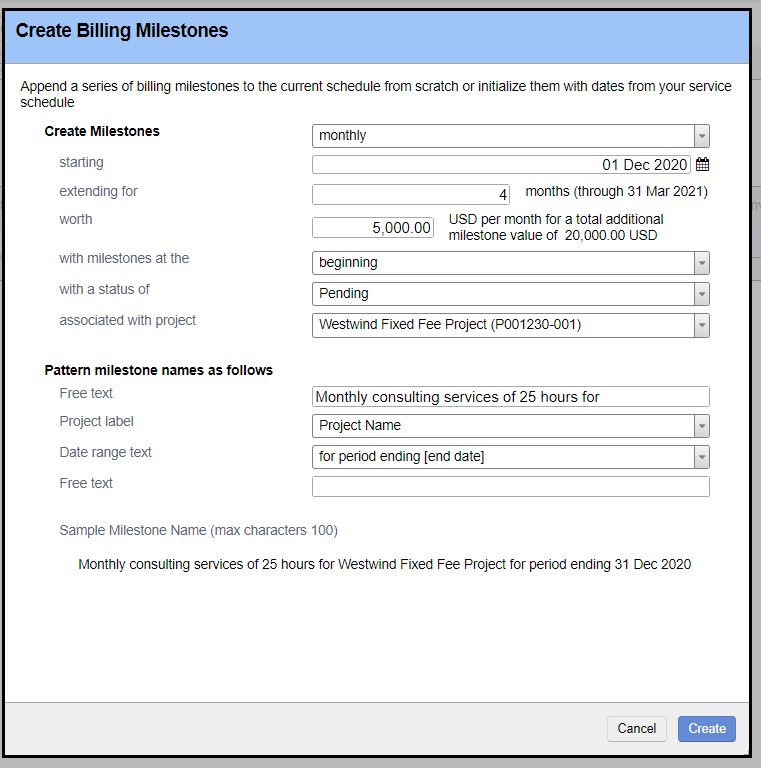Contract Line Item - Milestones
Create billing milestones for this contract. Milestones are used for:
- Invoicing Fixed Price contracts
- Modeling pre-payments on Time and Materials contracts
- Recurring payments on support or retainer type work
Milestones are most frequently used for billing on Fixed Price engagements. When you decide to bill for work you have done, you create a milestone, set it to achieved, and pull the milestone onto an invoice. This invoice is sent to the client for payment. See Fixed Price Invoicing for important examples of Time and Cost invoicing.
The second most common use of milestones is for creating prepayment invoices on T&M and Not to Exceed contracts. See the Prepayment Invoices for instructions on how to create a prepayment, issue it, and apply the prepayment against work in the future.
A third use is for invoicing recurring payments on support or retainer projects, where a fixed amount is invoiced for a number of pre-defined periods.
Revenue
A frequent question we receive is, "I invoiced this milestone, how come I don't see the revenue in my reports?" To be very clear, milestones do not generate revenue. There are only three ways to generate revenue in Projector.
- Approve a card on a T&M contract
- Run revenue recognition on a FP contract
- Invoice a FP cost card
If milestones don't generate revenue, then what do they generate? Deferred Revenue which represents labor you owe a client. It is a liability.
Permissions and Settings
Milestones
Each milestone generates rows in the grid pictured above. The table below explains each column.
| Field | Description |
|---|---|
| Milestone Name | The name appears on your invoices |
| Linked Project | Optionally specify which project is associated with this milestone. Useful if you invoice your clients at the project level. Also useful when viewing reports broken down by project, or when using the Project Dashboard. Can be left empty to not associate with any projects. For example, if a pre-payment is used to cover two separate projects linked to the same contract. |
| Project Task | Optionally specify a detailed task management task with this milestone. To enable this dropdown ensure that Detailed Task Management is ticked on Project - Setup Project. Only eligible tasks are shown in the dropdown. A task is eligible if:
Once you associate the milestone with a task, the Planned Date is no longer modifiable in this screen. The Planned Date is instead driven by the task date. Marking the task complete marks the milestone achieved. |
| Amount | The amount that the client should be invoiced for this milestone. Use a negative amount to issue a credit memo. |
| Planned Date | The date you plan to reach the milestone. If milestone is associated with a Project Task, this field cannot be edited. It is instead driven by the task end date. |
| Achieved Date | The date the milestone was actually achieved. Once a milestone is achieved you can no longer edit any other settings. If you wish to make changes click X in the date field. For milestones tied to DTM tasks you cannot manually set an achieved date. You must go mark the task achieved. |
| Status | The following status' are available
The status is set automatically except for Pending/Foregone. You can choose between Pending/Foregone as long as the milestone is unachieved. |
| Invoice Number | Shows which invoice this milestone is on. For example, DRAFT00432 or INV00223 |
| Description | A description of the milestone. This can optionally be included on your invoices by editing the template. |
Delete | Delete the current milestone. Only available for milestones that are NOT on an invoice. |
Create a (Recurring) Milestone Schedule
Click on create a milestone schedule to create multiple milestones at one time, each representing a different period of time.
The dialog allows for creating weekly, monthly, quarterly or annual milestones. Users will specify
- the frequency of the milestones
- the start date for the schedule
- the number of periods
- the value per period
- whether the milestone should be dated based on the period start or end date
- the milestone status (pending or achieved)
- whether the milestone should be associated with a project
Users can also specify the pattern for the milestone name, which is based on a combination of free text, engagement or project identifying information and the period date range.
Here is an example of the schedule created based on the above settings:



